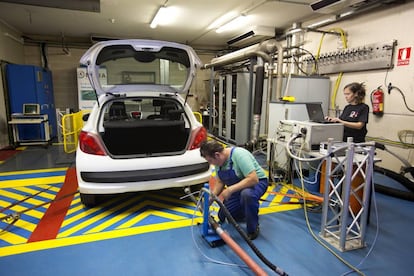Road tests reveal cars in Spain failing to meet EU diesel emission targets
Government study of 16 vehicle models shows discrepancy between lab results and real world conditions
Between December 2015 and August 2016, Spain’s Industry Ministry tested the exhaust emissions of 16 of the country’s leading diesel vehicles. All of them had higher nitrous oxide (NOx) levels when driven on the road than those permitted by the European Union (EU).

“There is a discrepancy between the values obtained [in a laboratory] and those obtained through real driving,” reads the ministry’s report.
Until now, passing a laboratory test was sufficient for a car maker to sell a diesel vehicle in Spain, but from September, the EU will introduce road testing as well.
Spanish carmaker Seat says it has removed defeat devices from around half the 700,000 vehicles fitted with them
The EU was shaken by the Volkswagen emissions scandal in 2015: the German car maker had installed software on the computers on its diesel vehicles to register lower emissions levels when connected to a laboratory computer. Several countries then agreed to carry out road tests on vehicles they had approved. Spain said it would analyze 30 models. But in the end, only 16 were checked, between 2015 and 2016; the government says it lacked the funding to test all 30.
The report, which has been seen by EL PAÍS, concludes that the 16 vehicles it road tested all had higher emissions levels than those registered when analyzed in a laboratory.
The diesel vehicles road tested by the Industry Ministry – from manufacturers Seat, Ford, Nissan, Volvo and Ssangyong – all had EU NOx limits that were between 1.8 and 12.6 times higher than permitted.
The ministry wrote to Nissan and Ssangyong, all of whose diesel vehicles registered significantly higher NOx emissions levels than allowed by law. The car makers recognized that “due to safety reasons in line with European regulations, some contaminating devices are deactivated when the ambient temperature is not within certain margins.” This answer was accepted, although the ministry notes in its report that “greater clarity on the part of the European Commission would be desirable regarding the conditions of use of said devices.”
The Spanish industry ministry’s report covered just 34 pages
The report also notes that the Spanish government will now require car makers to clarify the conditions under which “the activation and deactivation of emissions control devices” are produced.
In December, Brussels opened infringement proceedings against Spain for failing to take action against Volkswagen and asked for a report on the NOx emissions of a number of brands. Madrid refused to publish the report on the 16 vehicles until it was obliged to do so after NGOs Ecodes and Transport and Environment filed a request under Spain’s freedom of information legislation.
But Brussels is not satisfied with the report, suspecting that Madrid is not collaborating fully, say EU sources, and may well demand a second. The European Commission says that so far, only the reports submitted by Germany and the United Kingdom, which cover hundreds of pages, meet its requirements. Spain’s report was just 34 pages.
The Spanish Industry Ministry’s report concludes that none of the vehicles it road tested “showed any sign of having a deactivation device.” Spanish car maker Seat, which is part of the Volkswagen group, said on Tuesday that three of the vehicles checked by the Spanish Industry Ministry, the Seat Leon 2.0 TDI 125 KW, the Seat Altea 1.6 TDI 77 KW the Seat Leon FR 2.0 TDI 110 KW are fitted with illegal software that produces fraudulent emissions tests. The three vehicles are approved by the Spanish authorities, despite producing “NOx during the tests that are between two and four times higher” than the limits established by EU law.
In the wake of the Volkswagen scandal, Seat said that it would remove the so-called Defeat Device and has done so to around half the 700,000 vehicles affected.
English version by Nick Lyne.









































